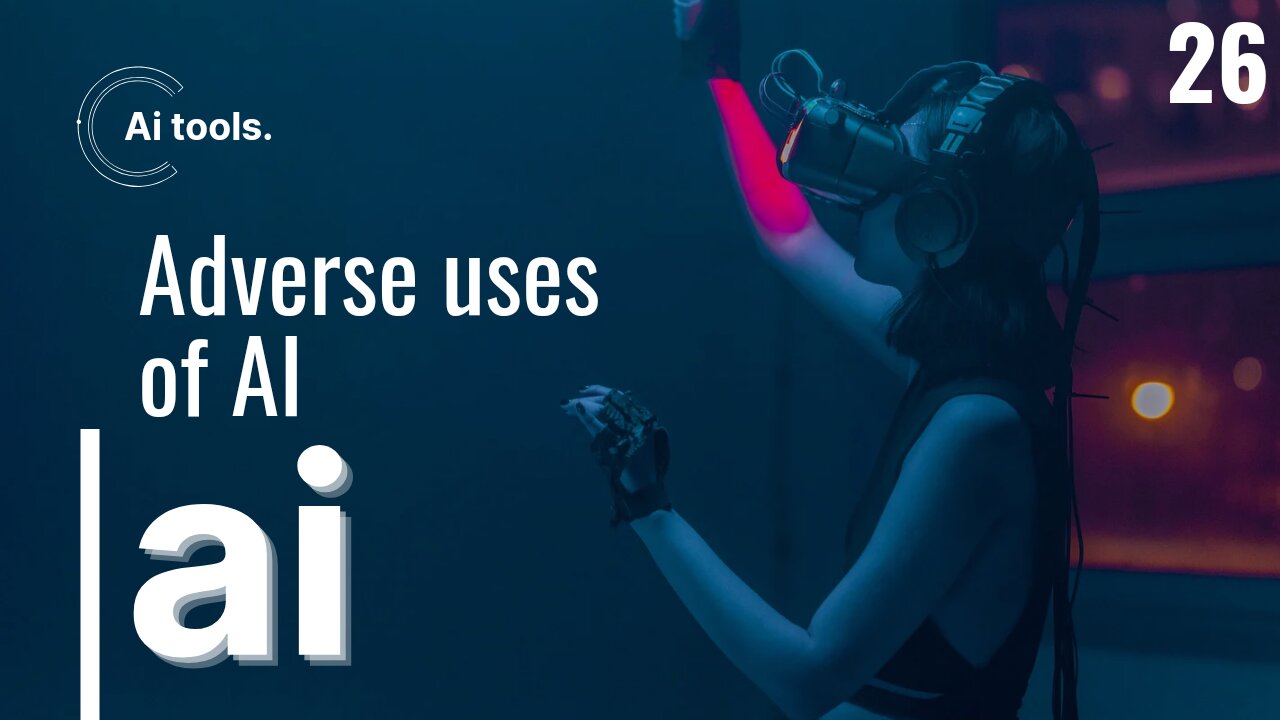Premium Only Content

Adverse uses of AI Part 26
AI is incredibly powerful and the vast majority of users of AI are making people, companies, countries, society better off. But there are a few adverse uses of AI as well. Let's take a look at some of them and discuss what we can do about them. AI technology has been used to create deep fakes and that means to synthesize video of people doing things that they never actually did. The website BuzzFeed created a video of former US President Barack Obama saying things that he never did. BuzzFeed was transparent about it and when they publish the video, it was really obvious because he told everyone that this is a fake video. But if this type of technology is used to target an individual and make others think they said or did things they never actually did, then these individuals could be harmed and left to defend themselves against fake video evidence of something they never actually did. Similar to the war of spam versus anti-spam, there is AI technology today for detecting if a video is a deep fake. But in today's world of social media, where a fake could spread around the world faster than the truth can catch up, many people are concerned about the potential of deep fakes to harm individuals. There's also a risk of AI technology being used to undermine democracy and privacy. For example, many governments around the world are trying to improve their citizens' lives, and have a lot of respect for the government leaders that are uplifting their citizens. But there are also some oppressive regimes that are not doing the right things by their citizens, that may seek to use this type of technology to carry out oppressive surveillance of their citizens. While governments have illegitimate need to improve public safety and reduce crime, there are also ways of using AI that feel more oppressive than uplifting of its own citizens. Closely related to this, is the rise of fake comments that AI can generate. Using AI technology is now possible to generate fake comments. Either on the commercial side, fake comments of products, or in political discourse, fake comments about political matters in the public discourse, and to generate fake comments much more efficiently than if you only had humans writing them. So, detecting such fake comments and weeding them out, is an important technology for maintaining trust in comments that we might read online as well. Similar to the battles of spam versus anti-spam and fraud verses anti-fraud, I think that for all of these issues, there may be a competition on both sides for quite some time to come. Similar to the battles of span versus anti-spam, fraud versus anti-fraud, I'm optimistic about how these battles will play out. Because if you take spam filter as an example, there are a lot more people that are motivated to make sure spam filters do work, that anti-spam does work. Then there are the smaller number of spammers trying to get this spam into your inbox.
-
 2:00:10
2:00:10
Twins Pod
5 hours agoYouth Pastor Confronts People Possessed By DEMONS! | Twins Pod - Episode 44 - Drew Hernandez
19.7K6 -
 1:37:40
1:37:40
The Quartering
5 hours agoShutdown Watch, Biden Dementia Bombshell, Madison Shooter Had An Accomplice & Much More!
57K23 -
 26:58
26:58
Stephen Gardner
4 hours ago🔥The Trump-Musk fight EXPLAINED, HUGE White House COVER-UP EXPOSED, Congress Tried To SCREW America!
34.8K27 -
 LIVE
LIVE
Right Side Broadcasting Network
8 days agoLIVE: TPUSA's America Fest Conference: Day Two - 12/20/24
4,900 watching -
 1:51:08
1:51:08
Tucker Carlson
7 hours agoJenner Furst: Secret Chinese Biotech Programs, and the Documentary That Could Put Dr. Fauci in Jail
145K107 -
 9:39
9:39
Film Threat
7 hours agoNOSFERATU | Film Threat Reviews
39.1K1 -
 14:33
14:33
IsaacButterfield
13 hours ago $4.31 earnedINSANE WOKE MEN OF TIKTOK!
41.1K14 -
 1:58:16
1:58:16
The Charlie Kirk Show
5 hours agoAmericaFest: Day 2 | Beck, McKoon, Steele, Nagao, Galaszewski, Bowyer, Brown, Amanchukwu | 12.20.24
105K12 -
 54:15
54:15
The Dan Bongino Show
8 hours agoSaving The U.S. Military w/ SEAL Andy Stumpf (Ep. 2392) - 12/20/2024
627K1.04K -
 2:53:55
2:53:55
The Dana Show with Dana Loesch
5 hours agoGOVERNMENT SPENDING BILL FAILS | The Dana Show LIVE On Rumble!
32K9